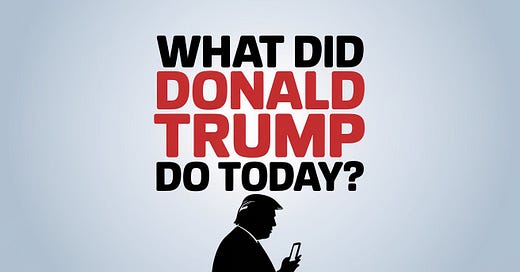Donald Trump’s recent activities, speeches, and policy decisions reveal a troubling blend of misinformation, political spectacle, and erosion of institutional norms. On Truth Social, he posted baseless claims accusing Kamala Harris of making illegal campaign contributions by paying celebrities like Beyoncé and Bono for endorsements disguised as performances. These assertions were unsupported and racially charged, consistent with his broader pattern of targeting liberal and especially Black public figures. In another post, Trump boasted of a ceasefire negotiation with Vladimir Putin, claiming he personally initiated peace talks between Russia and Ukraine—a constitutionally irregular assertion of foreign policy power that bypassed traditional diplomatic channels and ignored the complexities of war and international law. These social media posts exemplify how Trump continues to use his platform to blur the line between governance and performance, often substituting self-glorification and conspiracy for coherent policy.
White House Press Secretary Karoline Leavitt’s recent briefing echoed Trump’s combative and theatrical style, using partisan language and unverified claims to promote legislation dubbed the “One Big Beautiful Bill.” She made sweeping statements about economic growth and tax relief without citing data or independent analysis, while endorsing controversial Medicaid restrictions and even hinting at suspending habeas corpus—all without serious scrutiny. Her handling of foreign policy included exaggerated praise and falsehoods about Ukraine and Trump’s global reception, and she failed to repudiate conspiracy theories raised by journalists. Overall, the briefing functioned more as a campaign rally than a press conference, emphasizing loyalty and messaging over transparency.
At a bill signing ceremony for the “Take It Down Act,” aimed at combating AI exploitation and non-consensual image sharing, Melania Trump delivered a thoughtful, policy-centered address. In contrast, Donald Trump’s speech was disorganized, filled with unrelated anecdotes, and laced with offhand jokes that downplayed the trauma the bill was designed to address. His remarks frequently shifted focus from the bill to himself, Putin, or irrelevant grievances, undermining the event’s purpose and the bipartisan support behind it.
Similarly, a solemn Oval Office event meant to honor fallen law enforcement officers with the Medal of Sacrifice was overshadowed by Trump’s chaotic delivery, repeated digressions, and inappropriate self-insertion. He praised luxury brands, recounted personal test scores, and launched into a foreign policy rant—none of which honored the officers or their families with the dignity the occasion deserved.
At a Kennedy Center dinner, Trump delivered an off-topic, crude monologue that targeted marginalized groups and reimagined the arts as ideological battlegrounds. He mocked DEI initiatives, LGBTQ programming, and past leadership, portraying himself as the savior of the institution. His inappropriate humor and factually dubious claims, including false economic stats and fictionalized budget wins, turned a cultural event into a partisan spectacle.
Policy decisions have been similarly alarming. The Trump administration agreed to pay nearly $5 million to the family of Ashli Babbitt, portraying her as a victim rather than a participant in the violent January 6 insurrection. This politically charged settlement contradicted earlier DOJ findings and drew harsh criticism from law enforcement officials, who saw it as an endorsement of anti-democratic violence.
In immigration, a federal judge ordered the Trump administration to reestablish attorney access for a Venezuelan refugee secretly deported under the Alien Enemies Act to a supermax prison in El Salvador. The deportation, executed without due process, raises serious legal and human rights concerns, especially given the lack of criminal evidence against the detainee and reports of mistreatment at the facility.
Meanwhile, courts have pushed back on several Trump administration overreaches. A federal judge blocked Elon Musk’s Department of Government Efficiency from dismantling the U.S. Institute of Peace, ruling the takeover illegal and unconstitutional. Another judge ordered the administration to restore $176 million in climate and environmental grants frozen without congressional approval—an important reaffirmation of legislative authority over federal spending.
Finally, the U.S. Supreme Court allowed the administration to revoke Temporary Protected Status for 350,000 Venezuelan immigrants, clearing the way for mass deportations. Legal experts criticized the decision as abrupt and inhumane, with potential implications for similar TPS cases involving other nationalities. As deportations begin, legal battles continue in federal courts.
Collectively, these events portray a presidency defined by constitutional brinkmanship, political theatrics, and a growing disregard for democratic norms and institutional checks, whether through erratic foreign policy claims, performative press briefings, inappropriate public remarks, or legally dubious settlements and deportations.













Share this post